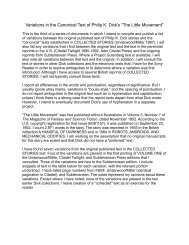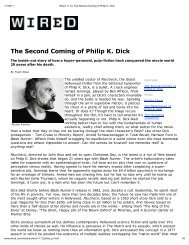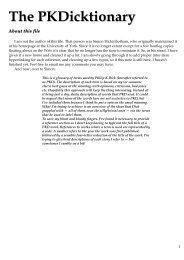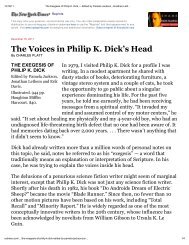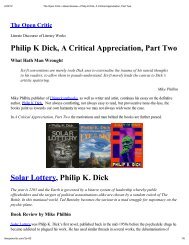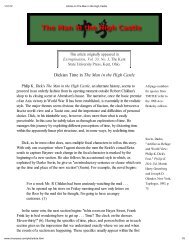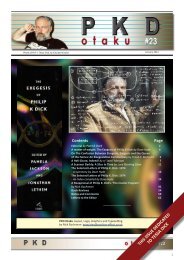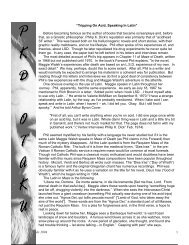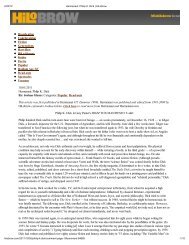PKD Otaku Issue 27 - Philip K. Dick Fan Site
PKD Otaku Issue 27 - Philip K. Dick Fan Site
PKD Otaku Issue 27 - Philip K. Dick Fan Site
Create successful ePaper yourself
Turn your PDF publications into a flip-book with our unique Google optimized e-Paper software.
Chandler wrote in a couple of letters to Hamish Hamilton:<br />
“The trouble with fantastic fiction as a general rule<br />
is the same trouble that afflicts Hungarian playwrights –<br />
no third act. The idea and the situation resulting from the<br />
idea are fine; but what happens then? How<br />
do you turn the corner?” (February 5, 1951)<br />
“If you want to know what I should<br />
really like to write, it would be fantastic stories,<br />
and I don’t mean science fiction. But<br />
they wouldn’t make a thin worn dime. That<br />
would be just a wonderful way to become<br />
a Neglected Author.” (September 22, 1954)<br />
[Raymond Chandler Speaking, Univ. of California<br />
Press, 1997]<br />
Now, I don’t know if this comparison/contrast<br />
between <strong>Philip</strong> K. <strong>Dick</strong> and Raymond<br />
Chandler has been any more clearly articulated<br />
than Hrafnhildur does here in her thesis, but it has<br />
surely become a pop-culture favorite amongst the literati.<br />
Mr. Lethem has described his first novel, Gun With Occasional<br />
Music (1994), as “<strong>Philip</strong> K. <strong>Dick</strong> meets Raymond<br />
Chandler.” Then there is this characterization of a Haruki<br />
Murakami novel, “Take one part hard-boiled detective<br />
fiction à la Raymond Chandler, throw in some <strong>Philip</strong> K.<br />
<strong>Dick</strong>, add a pinch of Kafka, a sprinkle of Borges.” Or, China<br />
Miéville’s novel, The City & The City (2009), as “If <strong>Philip</strong><br />
K. <strong>Dick</strong> and Raymond Chandler’s lovechild were raised<br />
by Franz Kafka.” And there is Clifford Royal Johns’ new<br />
novel, Walking Shadow (2012), “In a cross between Raymond<br />
Chandler and <strong>Philip</strong> K. <strong>Dick</strong>, Johns expertly explores<br />
themes of identity and morality.”<br />
Almost as important is what she writes about Phil <strong>Dick</strong>’s<br />
use of humor. Whereas Bolaño gives us the contention<br />
that Phil “owes more to Twain than to Melville,” Hrafnhildur<br />
writes, quoting Suvin, Phil’s “…sense of humor showed<br />
itself by deadpan assertions that left listeners wondering<br />
whether he was joking or revealing a strange new truth.”<br />
She adds that Phil “…makes a few comments on the necessity<br />
of seeing the humor in the universe,” quoting his<br />
from his 1978 essay, “Now Wait for this Year,” wherein<br />
he writes, “Our situation, the human situation, is in the<br />
final analysis neither grim nor meaningful,<br />
but funny. What else can you call it?” (ibid.,<br />
p. 7) Later, Hrafnhildur notes, “<strong>Dick</strong>’s novels<br />
tend to outdo the most absurd and craziest<br />
fiction, and his zany humor saves them the<br />
reader from getting lost in the absurdity.”<br />
(ibid., p. 20)<br />
Her most prescient comment, though, is<br />
“<strong>Dick</strong>’s use of humor adds to his novels a<br />
life-like appearance: the bewildering complexity<br />
of his plots, and often far-fetched<br />
ideas, are made real – and comic. Comedy is<br />
often the best way to get a message across,<br />
for emphasizing the hilarity of the topics involved<br />
makes them stand out too clearly to be missed.”<br />
(ibid., pp. 23-24)<br />
And in her “Conclusion,” she finally asserts, “Although Le-<br />
Guin claims <strong>Dick</strong> is not an absurdist, my view of his humor<br />
is that it lies partly in the absurdity of the contents of his<br />
text: the fun often lies in the absurd inconsistency between<br />
the narration and its subject matter.” (ibid., p. 73)<br />
Hrafnhildur has, in Empathy Will Save Us, indeed written<br />
a commendable and informative MA Thesis, though she<br />
does seek to pack an awful lot of incisive explication into<br />
only 78 pages. I would hope that if there is a book length<br />
version she adds more about <strong>Dick</strong>’s use of humor and his<br />
Chandleresque dialogue style. Most noteworthy, in my<br />
opinion, however, is that she did all of this without once<br />
mentioning the word “postmodernism.” Bravo, Hrafnhildur!<br />
[© FCB, 2/13]<br />
7 Some deep, underlying causal connection, not chance. Not coincidence.



